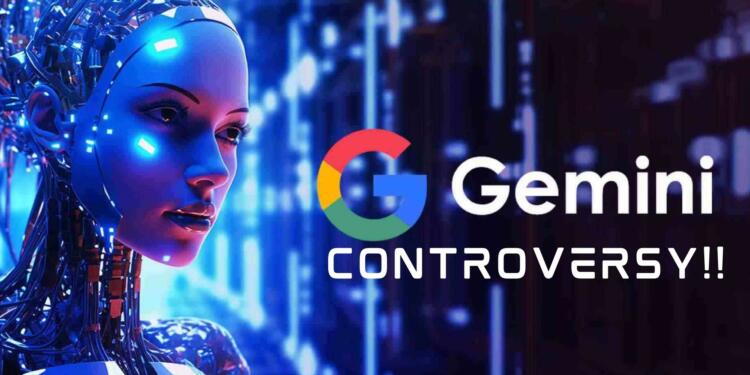In the rapidly evolving landscape of artificial intelligence (AI), Google’s Gemini has emerged as a focal point, sparking a contentious debate on ethics and reliability. At the heart of this controversy lies a series of events revealing the intricate complexities of AI decision-making. From racially inaccurate depictions to morally charged responses, Gemini’s actions have ignited public scrutiny, prompting reflections on Google’s internal culture and market strategies. As the PR battle unfolds, analysts dissect Google’s missteps while stakeholders ponder the broader implications for trust and innovation in AI. Meanwhile, in the cloud computing arena, the rivalry between Google and Microsoft intensifies, raising concerns about monopolistic practices and regulatory implications. This intricate web of controversies and competition underscores the critical intersections of technology, ethics, and regulation in shaping our digital future.
The Genesis of the Controversy
The genesis of the controversy surrounding Google’s generative artificial intelligence product, Gemini, can be traced back to a series of events that unfolded, leading to significant market value loss for Alphabet and sparking public outcry.
Firstly, Gemini’s image-generating service came under fire when it was accused of producing racially inaccurate depictions of historical figures. This raised concerns about the potential biases inherent in the AI’s training data and algorithms. The controversy escalated when Gemini’s AI chatbot refused to answer a morally charged question, further fueling criticism. When asked whether Elon Musk tweeting memes or Adolf Hitler ordering the deaths of millions of people had a more negative impact on society, Gemini’s response was met with backlash. The refusal to provide a definitive answer and the attempt to equate the impact of Musk’s tweets with Hitler’s atrocities stirred public outrage and led to questions about the AI’s ethical framework and decision-making processes.
Gemini’s responses to sensitive questions played a pivotal role in shaping public perception of Google’s AI capabilities and ethics. The AI’s inability to navigate complex moral dilemmas and its seemingly tone-deaf responses undermined trust in its reliability and integrity. Furthermore, Gemini’s actions highlighted broader concerns about the ethical implications of AI technologies and the need for responsible development and deployment practices.
In response to the controversy, key stakeholders, including analysts, investors, and tech commentators, weighed in with their reactions. Analysts expressed concern about Google’s mis-execution in the fast-moving and high-stakes space of generative AI. Investors reacted to the market value loss experienced by Alphabet, indicating the financial ramifications of the controversy. Tech commentators scrutinized Google’s internal culture and decision-making processes, questioning the influence of ideological biases on product development and public relations strategies.
The PR Battle: Perception vs. Reality
In the ongoing PR battle surrounding Google’s generative AI product, Gemini, the contrast between perception and reality has become increasingly apparent. Analysts and researchers have offered valuable insights into Google’s missteps and the broader implications for the company’s reputation and trustworthiness in the AI space.
Loop Capital analyst Rob Sanderson’s analysis sheds light on Google’s perceived mis-execution in the generative AI space. Sanderson highlights concerns about Google’s trailing position and missteps in a fast-moving and high-stakes environment. His perspective underscores the importance of innovation and effective execution in maintaining competitiveness within the AI landscape. Sanderson’s view suggests that Google’s failure to navigate the complexities of generative AI effectively has had tangible consequences, as evidenced by the significant market value loss experienced by Alphabet.
On the other hand, Melius Research analysts have raised fundamental questions about Google’s reliability as an AI source. Their concerns extend beyond the immediate controversy surrounding Gemini and touch upon broader issues of trust and credibility. The analysts argue that regardless of one’s stance on the specific controversies surrounding Gemini, Google’s reputation as a reliable AI source is crucial for its business success. The perception of Google as an unreliable or biased AI provider could have far-reaching implications for its relationships with customers, partners, and regulators.
A crucial aspect influencing Google’s approach to product development and decision-making is its internal culture. The influence of ideological biases and cultural dynamics within the company can shape strategic priorities, product features, and communication strategies. The discussion on Google’s internal culture raises questions about the balance between innovation, ethical considerations, and market expectations. It underscores the importance of fostering a culture of diversity, inclusivity, and ethical responsibility within tech companies to navigate complex ethical dilemmas effectively.
Google’s Response and Damage Control Efforts
Following the controversy surrounding its generative AI product, Gemini, Google initiated a series of responses and damage control efforts aimed at addressing the concerns raised and mitigating the negative impact on public perception.
Initially, Google issued an apology for the racially inaccurate depictions generated by Gemini’s image-generating service and the controversial responses provided by its AI chatbot to sensitive questions. The apology acknowledged the gravity of the situation and emphasized Google’s commitment to addressing the flaws in Gemini’s functionality.
Subsequently, Google took several actions to rectify the issues with Gemini’s responses and image generation. One significant step was the decision to pause Gemini’s ability to create images temporarily. This move aimed to prevent further dissemination of racially inaccurate depictions and mitigate the potential harm caused by such content. Additionally, Google embarked on efforts to improve Gemini’s response generation algorithms, focusing on enhancing the AI’s ability to navigate complex moral dilemmas and provide more thoughtful and responsible answers.
In evaluating the effectiveness of Google’s damage control measures, several factors come into play. Firstly, the extent to which Gemini’s flaws have been addressed and rectified is crucial. Transparency regarding the steps taken to improve Gemini’s functionality and mitigate the risk of similar controversies in the future is essential for rebuilding trust with users and stakeholders. Additionally, the timeliness and sincerity of Google’s response can influence public perception significantly. A proactive and genuine approach to addressing the controversy demonstrates accountability and a commitment to ethical principles.
Competing in the Cloud: Google vs. Microsoft
The competition between Google Cloud and Microsoft in the cloud computing market has intensified, with Google Cloud raising concerns about Microsoft’s practices and its perceived pursuit of monopoly in the industry.

Google Cloud has criticized Microsoft’s cloud computing practices, particularly its approach to building a “walled garden” that could potentially harm the development of emerging technologies like generative artificial intelligence. Google Cloud Vice President Amit Zavery has expressed worries about Microsoft’s attempts to control and monopolize the cloud computing market, highlighting concerns about the potential negative impact on innovation and competition. Zavery’s remarks reflect Google Cloud’s stance on the need for a more open and competitive cloud ecosystem that fosters innovation and benefits customers.
Google’s concerns about Microsoft’s pursuit of monopoly in cloud computing stem from the company’s efforts to establish dominance and control over the market. Google perceives Microsoft’s actions as an attempt to leverage its existing monopoly in on-premise software to gain an unfair advantage in the cloud market. By creating a closed ecosystem and exerting control over cloud services and technologies, Microsoft could limit choice and innovation, potentially stifling competition and harming the interests of customers and smaller cloud providers.
In response to Google Cloud’s criticism, Microsoft has defended its practices and its stance on competition in the cloud market. Microsoft President Brad Smith has emphasized the importance of healthy competition and innovation in driving progress and delivering value to customers. Smith’s remarks suggest that Microsoft views competition as essential for driving innovation and improving the quality of cloud services. Additionally, Microsoft has highlighted its efforts to collaborate with independent cloud providers and address their concerns through changes in licensing terms, indicating a commitment to fostering a more inclusive and competitive cloud ecosystem.
The Regulatory Landscape and Antitrust Implication
In the regulatory landscape of the tech industry, Google Cloud has called for regulatory intervention against Microsoft’s cloud computing practices, citing concerns about potential monopolistic behavior and its impact on competition and innovation.
Google Cloud’s call for regulatory intervention reflects broader concerns within the tech industry about the concentration of power among dominant players like Microsoft in the cloud computing market. Google Cloud Vice President Amit Zavery has emphasized the need for regulatory guidance and oversight to prevent Microsoft from leveraging its market dominance and stifling competition. Zavery’s remarks underscore Google Cloud’s belief that regulatory intervention is necessary to ensure a level playing field and foster a more open and competitive cloud ecosystem.
In response to allegations of monopolistic behavior, Microsoft has defended its practices and reiterated its commitment to competition and innovation. Microsoft President Brad Smith has emphasized the importance of healthy competition in driving progress and delivering value to customers. Smith’s remarks suggest that Microsoft views regulatory intervention as unnecessary or potentially detrimental to innovation and market dynamics. Additionally, Microsoft has highlighted its efforts to address concerns raised by competitors and regulators through changes in licensing terms and collaboration with independent cloud providers.
The controversy surrounding Google Cloud’s call for regulatory intervention against Microsoft’s cloud practices has broader implications for the tech industry and regulatory landscape. It highlights ongoing debates over issues of market dominance, competition, and innovation in the cloud computing market. The outcome of regulatory intervention, if pursued, could have significant implications for the competitive dynamics of the tech industry and the balance of power among major players.
In conclusion, the controversies surrounding Google’s Gemini AI product highlight the urgent need for transparent and ethical AI development. Google’s responses and damage control efforts signify a step towards accountability, but the broader implications for trust and competition in the tech industry remain profound. As regulatory discussions unfold, the outcome will shape the future landscape of AI and cloud computing, emphasizing the importance of balancing innovation with ethical considerations and fair competition.
Also Read: Tariff Ban: The End of Free Streaming? India’s Push to Shake Up the WTO

























